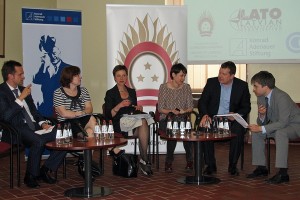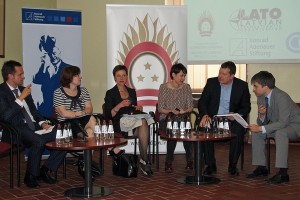
Russia exerts a negative influence over Latvia’s society through the mass media, deepening split, hampering the society integration processes and thereby posing threats to national security – such opinion was repeatedly accentuated at the public discussion “Mass Media’s Impact on Public Opinion, National Security and National Identity”. The discussion was held on May 10 in the premises of War Museum, assembling a full house of interested audience. It was organized by Latvian Transatlantic Organization (LATO), Centre for East European Policy Studies (CEEPS) and Latvian Institute of International Affairs.
Experts in various fields offered their presentations at the event – Atis Pabriks, Latvian Minister of Defence; Andis Kudors, Executive director of CEEPS; Kaspars Ozolins, CEO in the Baltics of “Modern Times Group” (“MTG”); Nellija Lochmele, Editor-in-Chief of the Publication House “Ir”; Sarmite Elerte, Freelance Advisor to the Prime Minister for National Identity, Civil Society and Integration Affairs; Aija Dulevska-Calite, Vice-Chairperson at the National Electronic Mass Media Council. The discussion was moderated by Edijs Bosch, Associate professor at Faculty of European Studies of Riga Stradins University.
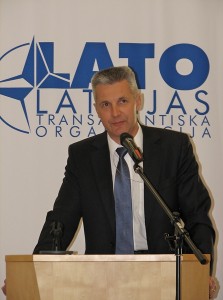
While addressing the audience as the first speaker, the Minister of Defence drew the present persons’ attention to the mass media’s considerable impact on the society and the fact that simultaneously this substantial force is regulated solely by understanding of ethics (which, as we know, is a quite vague notion) of the very mass media and their journalists. Thereby the information space can be easily used for implementation of various objectives, including the political ones. We know from the history that the mass media were playing an important role even in initiating the World War II, and it should not be considered that nowadays the use of this influential tool has decreased, says Pabriks. He indicates that these threats have not been treated seriously enough so far in Latvia, and there are no adequate mechanisms for countering them here. According to the Minister, it is necessary to find a way how, while not imposing restrictions on the mass media, to prevent posing threats to national security by them.
N.Lochmele stresses that the main threats to Latvia are coming from Russia which cannot be regarded as a free and democratic country and where the mass media are under control on the part of the state authorities. Since the Russian mass media are extremely popular among Latvian population, Russia’s influence through these media comprises quite real threat to Latvia’s security, says the journalist.
The opinion that Latvian residents, especially the Russian speakers, consume on the mass scale the products of the very Russian television channels, is supported also by the “MTG” CEO in the Baltics Kaspars Ozolins who has informed the discussion participants on the fact that 90% of non-Latvians chose the Russian channels. Ozolins emphasizes that, according to polling results, although non-Latvians are interested in the Latvian news, nevertheless they watch them on the First Baltic channel, not on Latvian TV.
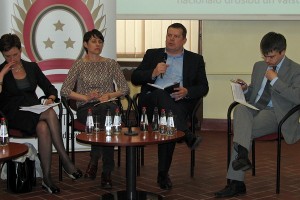
Referring to polling data, the CEEPS’s Executive director Andis Kudors indicates that Latvia’s residents trust the information presented by Russian television channels, and thereby the official Moscow’s messages which differ ideologically from Latvia’s position, become deeply rooted in their minds. Since the values of Latvia differ from the values of Russia, the mass media’s information often carries even quite the opposite message, and the society members acquire different, mutually conflicting opinions. That, in its turn, may lead to clash of values with the eventual political effects. The CEEPS’s Executive director also reminds that the objectives, defined in several Russian foreign policy documents, indicate that Russia would not decrease its influence, and therefore Latvia should take the necessary steps to neutralize it.
S.Elerte, too, mentions that the Russia’s stated goal is to impose influence on the neighbouring countries, including the Baltics, and she forecasts that the Russian mass media will probably continue implementation of this governmental position which is going to become still more aggressive. Elerte underlines the fact that democracy as a form of state administration, while protecting person’s freedom, is however fragile against the influence of unfriendly forces which can easily use democratic instruments, including NGOs and mass media, for their own benefit.
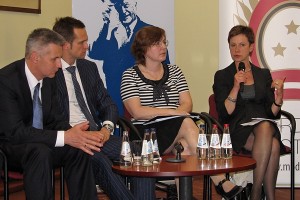
The opinion that purposeful actions causing split in the society are often perpetrated under the cover of freedom of speech, is supported also by A.Dulevska-Calite. She says that the deeds which can be regarded as incitement of hatred in the other countries, are considered as diversity of opinions in Latvia. She stresses that the information, transmitted by the Russian mass media, hampers promotion of understanding in Latvia’s society and stimulates conflicts, which is inadmissible. Information has been always used as a weapon in fighting, therefore all the necessary measures should be taken to defend our position in this warfare, calls Dulevska-Calite.
Both the experts and the other participants of the discussion offered also various solutions for improving the situation and resolving the problems. It was repeatedly proposed to raise the quality of the mass media thereby improving their competitiveness and drawing more audience. The possibility to set up a joint Baltic mass medium was discussed with the aim to create a competitive alternative to the Russian television channels. The necessity was also emphasized to prevent legislation’s falling behind in order to be able to overcome the new challenges caused by technology development. The experts admitted that the existing situation most probably lacked a single solution, and a combination of various ideas and actions would be most effective.
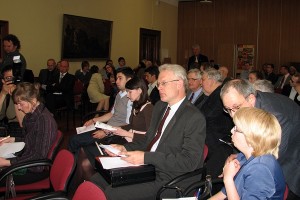
In the conclusion of the discussion, A.Pabriks underlined that the overall Latvian society is interested in positive regulation of the mass media market thereby preventing its split and promoting security and cooperation, not conflicts.
Considering the broad character of the theme under discussion and the large number of interested persons, the organizers of the event have promised to continue the public deliberation of the aforementioned issues.
